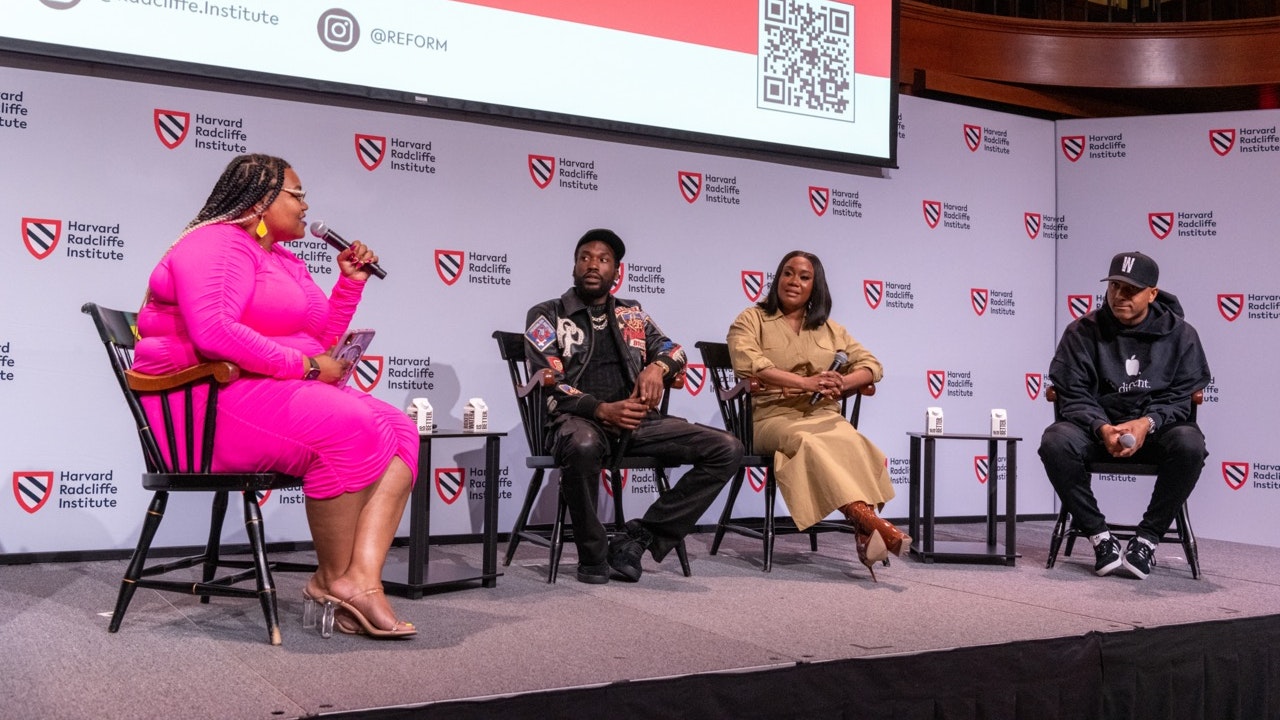Experience Is Expertise

Harvard Radcliffe Institute event centers the experience and voices of justice-impacted individuals—offering ideas and hope.
A hundred or so teens and young adults gathered at Harvard Radcliffe Institute’s Knafel Center on Monday afternoon for an invitation-only event titled “Justice-Impacted Brilliance: Experience Is Expertise.” Among those invited were Harvard students from Radcliffe’s law, education, and justice program and young people who have been affected in some way by the court and prison system and are involved with the Massachusetts Department of Youth Services. Many of the attendees had been told only that they were going to an event on justice reform.
At 3 o’clock, in walked Meek Mill.
The crowd erupted with excitement. And when Meek pulled out his phone and took a picture of the audience, the young people in the room raised their phones and saluted him in return.
Meek is an award-winning rapper with 24.3 million followers on Instagram. He is also one of the nation’s top voices for parole and probation reform, cofounding the advocacy group Reform Alliance with several partners, including Jay-Z.
The event’s catalyst, Brittany White, is a joint visiting practitioner in residence at Radcliffe and Harvard Law School (HLS), an organizing fellow at HLS’s Institute to End Mass Incarceration, and a formerly incarcerated Black woman. For her, the event was about learning and legacy.
“One day, we will all be ancestors,” she said after the event. “My hope is to leave this world better than I found it. For that to happen and my work in decarceration to remain relevant, we need to engage and center young people.”
—Brittany White
Meek was there to discuss changing the probation and parole system as part of his work helping to make the US justice system more just. He spoke not only as a cofounder of Reform Alliance but also as a former incarcerated man from Philadelphia. In addition to Meek and White, the expert panel included Wallo, who spent 20 years in prison and is now a successful podcaster, influencer, and speaker on prison reform, and Ayana Bean, a Mattapan native who served federal time and now works as an advocate for at-risk women.
The law, education, and justice initiative behind the event was created by Radcliffe’s dean, Tomiko Brown-Nagin. The initiative was designed “to support the rights of incarcerated and formerly incarcerated people and spotlight the devastating impact of mass incarceration in this country,” Brown-Nagin said in opening remarks.
When Meek cofounded Reform Alliance five years ago—shortly after his release from prison—the organization chose to target probation and parole reform after finding that nearly 44 percent of people released from prison nationwide end up returning in less than a year. Meek himself was sentenced up to four years on a technical parole violation in 2017 and was not released until a popular #FreeMeekMill movement called for change.
In addition, nearly a quarter of the nation’s prison population goes back to jail over noncriminal technical violations. He used himself as an example: Having gained fame, Meek moved his young son to New Jersey to escape Philadelphia’s epidemic of gun violence. But to drive from Pennsylvania to New Jersey to pick up his son after school, he must seek permission from his parole officer. Without that permission, that short trip is a violation.
“It is rare to center people with lived experience of incarceration as the experts and that is what happened on that stage,” said Kaia Stern, practitioner in residence for Law, Education, and Justice, as well as the cofounder and director of the Prison Studies Project at Harvard and a faculty member at the Harvard Graduate School of Education, where she coleads the Transforming Justice Initiative. “To have a quarter of the audience be young people who are already familiar with the harms of our criminal legal system and to have them join us as honored guests in that space was a gift to us all. Never have I been part of an event like this in my 20 years at Harvard.”
US Attorney for the District of Massachusetts Rachel S. Rollins was in the audience, having recently met and been impressed by White’s activism and presence.
“I wanted to come and sit down and learn from these great people,” said Rollins, who, as elected district attorney, has worked in the past with Reform Alliance.
“I think the more we can have elected and appointed prosecutors hearing from impacted parties, the better we’re going to be,” continued Rollins. “We sit down and listen to law enforcement as we should. We sit down and listen to prosecutors, as we should. We sit down and listen to judges and probation. Why don’t we spend more time with people that have touched the system that we’re involved in? And it was just my honor to sit and listen, not as a panelist or anything else but just to learn from other people and sometimes just be quiet.”
—US Attorney Rachel S. Rollins
“Took a long while to get here,” said Robert Rooks, CEO of Reform Alliance, during his remarks as he looked out at the audience in the wood-paneled room. “Took a long while to get here, where Harvard is convening rooms like this.”
The effect of so much cumulative experience with the system seems to have left a mark on those in the room. “You guys all redefine the word ‘brilliance’ to me,” said an audience member who identified himself as Gene. During the Q and A at the event, he rose and addressed the panel, “One thing that I’m leaving this talk with is understanding that brilliance is resilience. All of you … on the panel have showed that you have fallen, and you’ve been able to get back up.”







